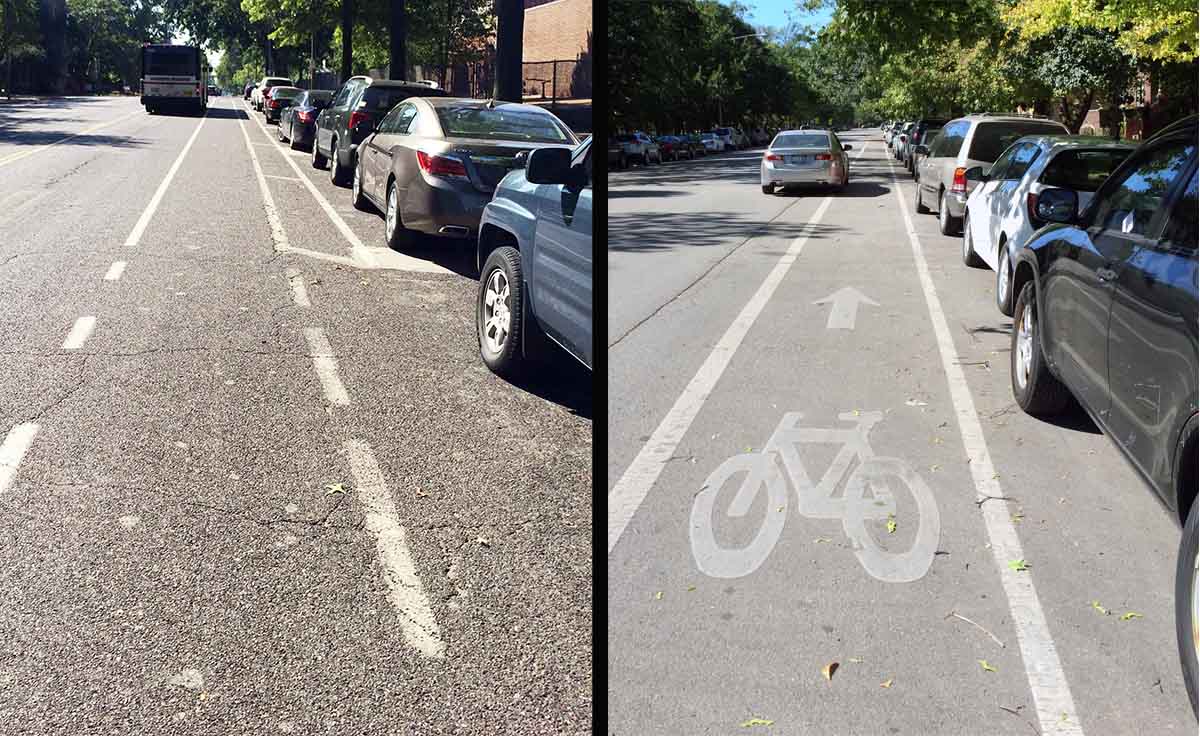
St. Louis vs. Chicago bike lane: What's wrong with this picture?
When Bicycling magazine named Chicago as 2016's most bicycle-friendly U.S. city, the news was soon followed by our town's fifth bicycling fatality this year.
That got me thinking about the unfriendly side of Chi biking: the hundreds of bike crashes, whereby bikers gets hurt, that occur each year.
Take, for example, my housemate's recent bicycle crash: She got doored in a Chicago bike lane. The resulting injury required knee surgery. What's more, it was her second dooring—and her second knee surgery. The first time, seven years ago, she injured the other knee.
Years ago, when I started to teach traffic cycling, I taught my students to ride on the left side of bike lanes—to avoid what I and others began calling "the door zone." At the time, it seemed like teaching a child to use a kitchen knife: You had to learn it, because bike lanes—like big, sharp knives—were inherently dangerous. Why? Because the city often installed bike lanes just to the left of parked cars, so the right two-thirds of a bike lane put bikers on a collision course with opening car doors.
Over the years, in my role as bicycling author and instructor, Chicago bikers told me countless "dooring" stories. One gal I met could not recall her dooring crash; she remembered biking carefully (or so she thought) down Halsted, and the next moment she was waking up in a hospital bed, her skull fractured. Not surprisingly, she said she couldn't bring herself to bicycle again.
At some point, Chicago bike planners got the memo: The city began using a bike lane design that includes a striped buffer next to parked cars, showing bikers where not to ride. Unfortunately, many miles of "unbuffered" legacy lanes are still out there.
I just got back from visiting St. Louis with my bicycle. To my wonder, most of the lanes I saw had a buffer in the door zone. What's more, these lanes looked old. Many of Chicago's buffered bike lanes, in contrast, look relatively new—reflecting the recent innovation that they are.
While biking around in view of the Mississippi River and the Arch, I thought about these two Midwestern cities: St. Louis, with its unheralded but cannily safe, buffered bike lanes; and Chicago, with its shiny, new Bicycling magazine award.
Mayor Rahm Emanuel is surely proud of getting the "most bike-friendly city" prize. But no one in the Emanuel administration (or at Bicycling magazine, for that matter) is talking about the fact that many Chicago bike lanes are a set-up: The lanes lure credulous cyclists with the appearance of safety, while they actually place bikers in danger that's both predictable and ongoing.
The mayor and his factotums like to brag about how many miles of new, "protected" bike lanes the city is paying for each year. Why not put that effort on hold—and, instead, spend the money on fixing Chicago's legacy lanes, all of which are crashes waiting to happen?
It won't win Rahm any awards—which maybe is why it won't happen any time soon.